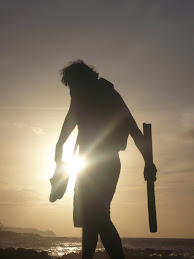photo: Bok Choy gone to seed in ADRA's office plot
Springtime in Mongolia: minus 10C days, minus 20C nights.
Most crops we know in the West will not yield a quality harvest below minus 9.4C(i). This is only one of the many challenges facing food security efforts in Monglia.
photo: hands coated with sooty coal grime after harvesting the seedstalks.
A filmy haze of smog glazes the otherwise clear sky above Ulaanbaatar as the sun stubbornly persists in blazing through; temperatures are noticeably lower in the buildings' shade.
As I navigate the crowded streets, the massive coal-fired power plants we passed on the way into the city center from the airport relentlessly belch clouds of grey smoke, the smell of which mixes with diesel fumes from car exhausts, and burning plastic waste from the ger stoves of Ulaanbaatar's ever-expanding outer settlements. The rocky sidewalks, which we so carefully picked out way across during the summer, give me grip in the snow-turned-ice which has been trampled into the streets. The lush green hedges and trees now stand bone-white, or grey, buds tightly coiled on their branches awaiting warmer temperatures to burst forth again. It is easy to talk about minus 40C temperature extremes when you are in the midst of summer, and marvel at people's ability to survive such extremes, but to begin to experience what that actually feels like is quite something else - and locals tell me that it is actually quite warm out today. I am out of breath just walking from my hotel to the expat cafe where I type this entry, rugged up in 4 layers + a hardy, Swedish-army-issue jacket that feels like I am wearing a dead animal hide turned inside-out; it's 1,500m above sea level in the capital. Meanwhile, the locals are enjoying the springtime sunshine, strolling briskly without hats or gloves, squinting and smiling into the sun while kids wrestle and laugh on the steps of their schools, waiting for parents to pick them up. This is a land full of contrasts: blazing sun / cold temperatures; brand-new Hummers pausing for nomads clad in traditional deels (trenchcoats) crossing the streets; street-hustlers hawking wares to suited businessmen; multi-million-dollar mining deals being negotiated in bars while street kids crawl out of manholes outside to survive another day... In two days time, we will be headed out to the westernmost settlement of Mongolia, nestled in the valleys of Bayan Ulgii province, home of the ancient Kazakh Eaglehunters. These are some of the most resilient people on the planet, who have learned to live with the harshest forces of nature around them, and while my employer is confident that I have some information to share which will help them, I am sure that there is more for me to learn here than I could ever hope to teach.

photo: Bek and great Eaglehunter Mr. Saylaukhan, utilizing Bayan Ulgii's Biological Resources...
Bek(ii) and I had long conversations last night about what we hope to accomplish in the next 27 days - 'Sustainable Economic & Agricultural Learning' is quite a mouthful, and quite an ambitious goal to achieve in so short a timeframe - so we wrote our introductory speeches to the class:
" 'To educate' means 'to draw from', which means that we are here to help draw out the knowledge & intelligence that each of you has, so that we can share & support each other in learning & growing together.
As your Instructors, we will function more like Guides, helping you to understand things from new perspectives, giving new information where necessary and drawing from your own knowledge, to help you build a strong foundation to continue your learning journey. None of us is smarter than all of us."
If we can leave our students nothing else but the mindset and inspiration to ask themselves, and each other, the right questions: 'What worked? What didn't work? How can we improve?', than we will have made a positive impact. And along the way, if we can equip them with a new baseline of skills, knowledge, and perspective, than we might just spark a regenerative cycle of innovation and self-directed, collaborative learning - which can spread organically, virally... and hopefully infect inspire a movement towards securing personal sovereignty and security, in the face of increasing global adversity.
Changing the world begins at home; wherever your home may be.
Wish us luck.
endnote references:___________________________________
(i) 'The Winter Harvest Handbook' , by Elliot Coleman
, by Elliot Coleman
(iI) Tilyeubek Ye, Food Security Director for ADRA-Mongolia
endnote references:___________________________________
(i) 'The Winter Harvest Handbook'
(iI) Tilyeubek Ye, Food Security Director for ADRA-Mongolia


No comments:
Post a Comment